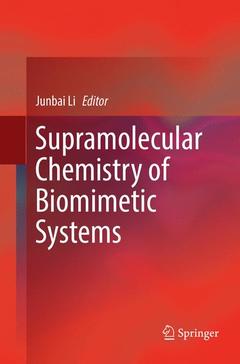Description
Supramolecular Chemistry of Biomimetic Systems, 1st ed. 2017
Coordinator: Li Junbai
Language: English
Subject for Supramolecular Chemistry of Biomimetic Systems:
Keywords
Supramolecular chemistry; Molecular biomimetics; Molecular assembly; Supramolecular assembly system; Peptides; Proteins; Molecular motors; Two-photon confocal microscopy; Diffraction-limited fluorescence microscopy; Total internal reflection fluorescence microscope (TIRFM); Metal-shadowed electron microscopy
Publication date: 12-2018
Support: Print on demand
Publication date: 10-2017
Support: Print on demand
Description
/li>Contents
/li>Biography
/li>Comment
/li>
This book investigates the latest developments in supramolecular assembly systems for mimicking biological structures and functions. Consisting of 14 chapters, it covers various assembly systems, such as polysaccharides, peptides, proteins, biopolymers, natural materials and various hybrid systems. Further, it focuses on different types of supramolecular systems with particular functions or structures that are relevant to living systems. A number of modern techniques used to study the supramolecular systems, such as total internal reflection fluorescence microscopy (TIRFM) and two-photon confocal microscopy, are also introduced in detail.
Unlike conventional books on supramolecular assemblies, this book highlights the functions of the assembly systems, particularly their biological applications. As such, it offers a valuable resource for experienced researchers, as well as graduate students working in the field of supramolecular chemistry and biomimetic systems.
Part 1 Introduction to Supramolecular Chemistry and Biomimetic Systems.- Molecular Biomimetics and Molecular Assembly.- Advantages of Self-Assembled Supramolecular Polymers towards Biological applications.- Part 2 Biomimetic Membranes.- Nanoarchitectonics of Biomimetic Membranes.- Part 3 Biomolecules Based Molecular Assembly.- Polysaccharides Based Microcapsules.- Hemoglobin Based Molecular Assembly.- Photosystem II based Multilayers.- Peptide based Supramolecular Chemistry.- Functional Nanomaterials via Self-assembly Based Modification of Natural Cellulosic Substances.- Part 4 Molecular Assembly of Motor proteins and artificial Micro-/Nanomotors.- Directional Transportation of Assembled Molecular Linear Motors.- Reconstitution of Motor Protein ATPase.- Controlled Molecular Assembly towards Self-Propelled Micro-/Nanomotors.- Part 5 Hierarchical Dendrimer, Polyoxometalates Complexes and Inorganic-organic Hybrid Systems.- Functional Dendrimer-based Vectors for Gene Delivery Applications.- Polyoxometalates and Their Complexes toward Biological Application.- Inorganic-Organic Hybrid Materials Based on Nanopolyoxometalates.
Junbai Li received his PhD from the Department of Chemistry, Jilin University in 1992. He then served as a postdoctoral fellow at the Interface Department of the Max Planck Institute of Colloids and Interfaces in Germany from 1994 to 1996. He is currently a professor at the Institute of Chemistry, the Chinese Academy of Sciences. He has been an editor of Colloids & Surfaces A since 2005 and became editor-in-chief in 2017. He has also been a section editor of Current Opinion in Colloid & Interface Science since 2006. His main research interests are molecular assemblies of biomimetic systems, self-assembly, biointerfaces, and the design and synthesis of bioinspired materials with various nanostructures.
Describes the latest advances in the supramolecular chemistry of biomimetic systems
Introduces a number of modern techniques applied to supramolecular chemistry
Provides a new vision of biomimetic systems
Includes supplementary material: sn.pub/extras

